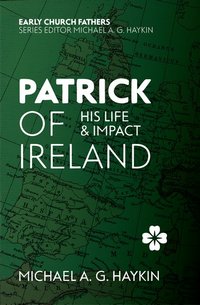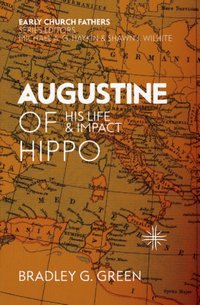 Patrick of Ireland:
Patrick of Ireland:
His Life and Impact
by Michael A.G. Haykin
Series: The Early Church Fathers
Publisher: Christian Focus Publications
Publication Date: February 02, 2018
Format: eBook
Length: 112 pgs.
Read Date: February 19, 2023

I came to the people of Ireland to preach the Gospel, and to suffer insult from the unbelievers, bearing the reproach of my going abroad and many persecutions even unto bonds, and to give my free birth for the benefit of others; and, should I be worthy, I am prepared to give even my life without hesitation and most gladly for his name, and it is there that I wish to spend it until I die, if the Lord would grant it to me.
The Series
In case you hadn’t read what I thought of the other books I’ve read in this series, let me start with the thumbnail description of the series I came up with:
I literally stumbled on this series, The Early Church Fathers, a few weeks ago and thought it sounded like a great idea. It looked kind of like a mix of Crossway’s Theologians on the Christian Life and Oxford’s Very Short Introductions (incidentally, that’s what it ended up being).
What’s Patrick of Ireland About?
Like the other books in this series, Haykin starts with a biographical sketch of Patrick—noting the difficulties around that due to the small bibliography we have from him and the large number of myths and hagiography surrounding him. He then moves into considering Patrick’s Trinitarianism, his vision for evangelism/missions. Finally, he looks at “the balance of the Word and Spirit in Patrick’s thinking and experience.”
His Life
…there are a number of aspects about his life that are not at all clear- cut. There is no agreement, for example, about the date of his birth or the location of his childhood home, or about the place of his captivity in Ireland or whether or not he had formal theological education; nor is there any agreement about the dates of his ministry in Ireland.
We do know some things—mostly from his own hand—but scholars have to wade through a lot of chaff. R.P.C. Hanson is cited as summarizing it as: “Patrick’s life has become subject to a large amount of hagiographical embroidery and fictitious enhancement.”
That fictitious enhancement is where a lot of what I grew up “knowing” about Patrick, and I’d wager it’s the same for a lot of you.
…from the Middle Ages onwards, his mission to Ireland was depicted as one astounding miracle after another. For example, Jocelin of Furness (fl.1175–1214), the English Cistercian hagiographer, explained the absence of snakes in Ireland to be the result of Patrick’s destruction of them all on the peak of Croagh Patrick (St Patrick’s Mountain) in County Mayo. Jocelin also tells us that Patrick as an infant was baptized by a blind priest who got the water for the baptism by causing Patrick to make the sign of the cross over some earth, from which a well of water immediately issued. The water cured the priest of his blindness and enabled him, though illiterate, to read the rite of baptism. According to other miracles ascribed to Patrick, he was able to pass through doors, like the risen Christ, and could turn butter into honey.
At the end of the day, however,
Unlike the otherworldly miracle worker depicted by later biographies of Patrick, the two authentic writings from Patrick reveal a typical fifth- century bishop who was involved in preaching, baptizing, celebrating the Lord’s Supper, confirming new converts, and ordaining ministers.
Because of—or maybe despite—the dearth of information we have about him, what can be established is all the more interesting.
His Theology
Haykin focuses on two primary areas—Patrick’s Trinitarianism and his Missiology. Thankfully, we have his two written works to learn from here.
Without any references to the shamrock (thankfully), Patrick’s full-orbed Trinitarianism shines through his writings. After the last couple of entries in this series were so filled with controversy over the doctrine, it’s so refreshing to read one absent it.
I also appreciated the simple and straightforward nature of Patrick’s missiology and doctrine of the Church. He lived the kind of life he described and called others to. The fact that, in his mind, evangelizing the Irish was bringing the gospel to the literal end of the earth and thereby he was helping to bring in the Last Days, makes his work all the more remarkable. He didn’t call people to a temporary faith, he actually established believers and churches that lasted.
So, what did I think about Patrick of Ireland?
This is the best one of these books since the Augustine volume (maybe even better than it).
I enjoyed it—it helped increase my understanding and appreciation of the subject, and I learned a little bit about how little we know. (I read his Confessions more than a decade ago, and need to dig it out again)
I don’t think I got as much from this as I did from some of the others in this series—but that’s a quirk of the source material, and that has its own charm. Seeing what others have established, and what Haykin has synthesized here is the impressive bit.

This post contains an affiliate link. If you purchase from it, I will get a small commission at no additional cost to you. As always, the opinions expressed are my own.
![]()





